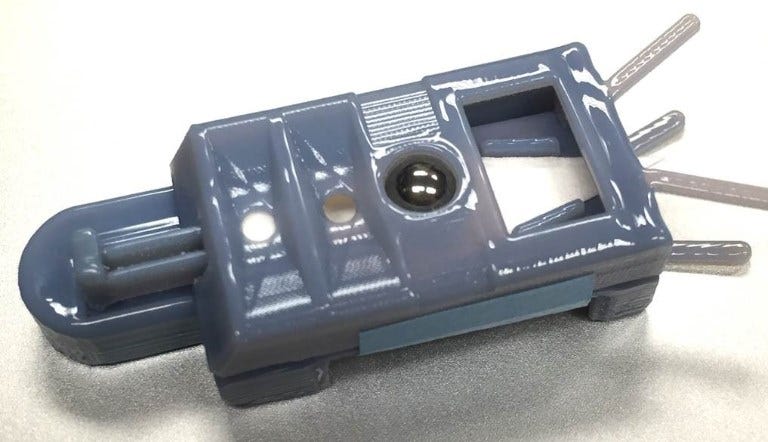Device Aims to Decode Drug Overdoses
 With a single drop of blood
With a single drop of blood
Subscriber Benefit
As a subscriber you can listen to articles at work, in the car, or while you work out. Subscribe NowLaw enforcement and the medical industry struggle to keep pace with the ever-changing landscape of designer drugs—those created in underground, illegal labs. When patients arrive in emergency rooms (ERs), it’s typically a guessing game to determine what illicit drug led to an overdose. However, an IUPUI researcher is creating a device that could help doctors rapidly decode a drug overdose, and two Indianapolis ERs will be armed with the technology this summer.
IUPUI Chemistry and Chemical Biology Assistant Professor Dr. Nicholas Manicke says hospitals and clinics are able to test for illicit drugs, but science hasn’t kept pace with modern street drugs; current tests can only detect traditional drugs that “have been around for a while,” such as meth and marijuana.
“They can’t detect the newer agents that are starting to cause a lot of drug overdoses,” says Manicke. “For example, a very significant portion of heroin overdoses in the ER are actually not heroin; they’re fentanyl (an opioid with heroin-like effects) analogs, but the drug-screening tests in hospitals can’t detect fentanyl analogs for the most part. It’s the same for marijuana; there are screening tests for normal marijuana, but not synthetic marijuana.”
The National Institute on Drug Abuse (NIDA) says deaths from fentanyl increased at least 200 percent between 2013 and 2015, underscoring the need to detect its presence. The institute also reports that most designer drug-related ER visits in the U.S. are a result of using fentanyl and synthetic cannabinoids, which are man-made mind-altering chemicals such as K2 and Spice.
Manicke’s strategy relies on a method called mass spectrometry, an analytical technique that measures the masses within a sample. Mass spectrometers are able to detect and identify very low levels of chemicals—such as drugs—in blood samples. However, Manicke says their use has been limited, because preparing a sample to be tested on the instruments is a very complex process; a blood sample must be collected, packed on ice and shipped to a central lab.
Boosted by NIDA funding, Manicke has developed a cartridge he says not only speeds and simplifies the detection process, but also identifies the designer drugs that conventional testing misses. The cartridge, costing less than $10, is loaded with the necessary chemistry to quickly prepare the blood sample for analysis on a mass spectrometer. Unlike current tests, the method can detect synthetic opioids, such as fentanyl analogs, and cannabinoids, including synthetic marijuana, K2 and Spice.
“What we’re trying to accomplish with our [method] is to make a simple, single-use cartridge that someone could put a drop of blood on and immediately analyze it by the mass spectrometer,” says Manicke. “This is similar to a lot of other clinical tests done in hospitals now—simple, cartridge-based tests with a drop of blood; we’re trying to emulate that approach for these more complex tests on synthetic drugs.”
In addition to identifying the drug present in the drop of blood, the cartridge also measures the drug’s concentration.
“Understanding the concentration is important too,” says Manicke. “There’s very little known about the toxicology of the compounds, so understanding the levels and doses that cause toxicity is quite important.”
Manicke says giving doctors rapid answers with a more comprehensive drug test could impact how they treat patients. A second major goal is to provide clarity for public health leaders. This summer, ERs at Eskenazi Health and Indiana University Health Methodist Hospital in Indianapolis are using the cartridges to test for designer drugs.
“We may know synthetic marijuana, in general, is causing ER visits…but there are a lot of different compounds that can be found in synthetic marijuana,” says Manicke, “and we want to know what actual chemical compounds are causing ER visits and which ones are particularly dangerous.”
Manicke’s lab is currently 3-D printing the cartridges, “and that’s pretty laborious,” he says. Indianapolis-based Prosolia, Inc. creates chemistry tools to expand the use of mass spectrometry; it’s been involved in the cartridge project and is commercializing an earlier technology Manicke developed.
“Ultimately, we’re going to need a commercial partner that can manufacture these if this is going to continue to have legs,” says Manicke. “That may be Prosolia or another company, but having commercial partnerships in this type of research is very important as the technology matures.”
Manicke believes the results gathered this summer at the two Indianapolis ERs will paint a clear picture of what synthetic drugs are the most prevalent—providing clarity for doctors, knowledge for public health leaders and better science for drug testing.
Manicke says he’s excited to be “on the front lines” this summer, working with patient samples and providing valuable information for ERs.
Manicke explains how samples will be collected this summer using prototype cartridges.
